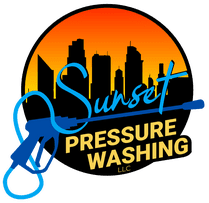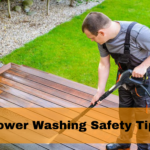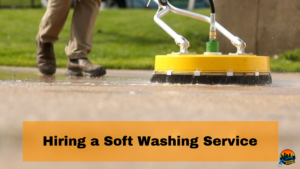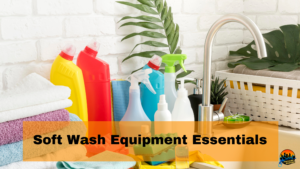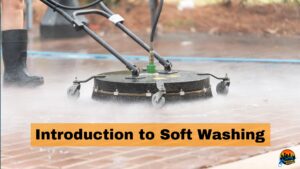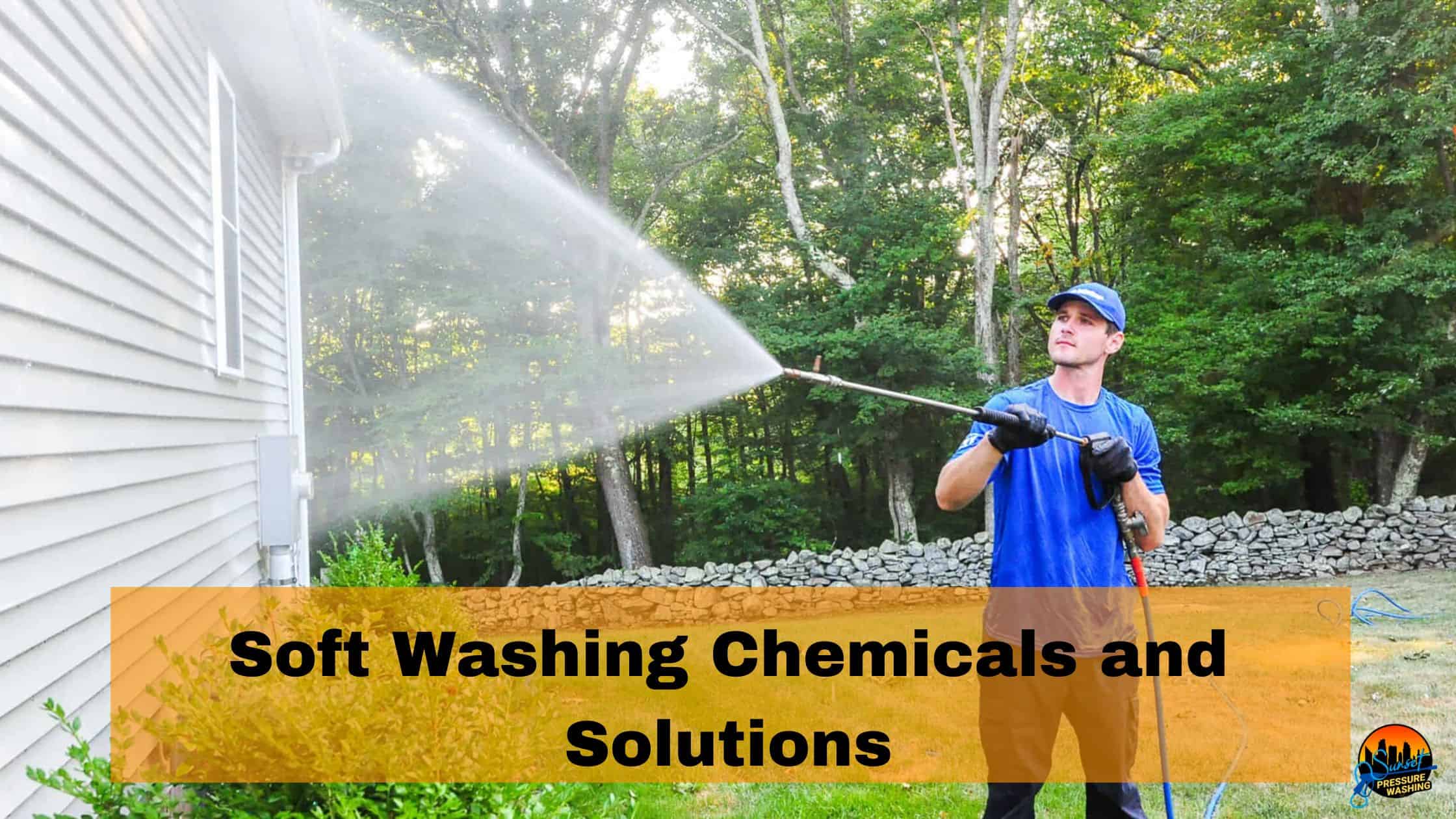
Soft Washing Chemicals and Solutions
Soft washing is a highly effective and gentle cleaning method used to remove dirt, grime, algae, mold, and mildew from exterior surfaces such as roofs, siding, decks, and patios. Unlike pressure washing, soft washing relies on eco-friendly chemicals and solutions to do the heavy lifting, making it safe for delicate surfaces. This comprehensive guide delves into the world of soft washing chemicals and solutions, ensuring you have all the information you need for a successful clean.
Understanding Soft Washing
Soft washing is a revolutionary cleaning technique that prioritizes both the cleanliness and preservation of exterior surfaces. Unlike its counterpart, pressure washing, which relies on high-pressure water jets to remove dirt and grime, soft washing uses a low-pressure delivery system. This method significantly reduces the risk of damage to delicate surfaces such as roof shingles, siding, and even landscaped gardens that are easily harmed by high pressure.
The core of soft washing lies in its use of specialized cleaning solutions. These solutions are formulated to tackle a variety of stains, including algae, mold, mildew, and other bacterial growths, which are common issues on exterior surfaces exposed to moisture. The process involves applying these chemical solutions at a low pressure, allowing them to penetrate the dirt and organisms. After a suitable dwell time, during which the solution breaks down the unwanted substances, the area is gently rinsed with water at a low pressure. This ensures that the surface is cleaned thoroughly without the abrasiveness of high-pressure washing.
Soft washing not only cleans but also sanitizes surfaces, offering a longer-lasting clean. By effectively killing the spores of algae and mold, it prevents their quick return, keeping surfaces cleaner for a longer period. This aspect of soft washing makes it an excellent choice for maintaining the appearance and longevity of your property’s exterior surfaces.
Moreover, soft washing is adaptable to a wide range of materials, including wood, vinyl, aluminum, brick, and concrete, making it a versatile cleaning option. It’s particularly beneficial for roofing materials, as traditional pressure washing can dislodge granules from shingles, reducing their lifespan. Soft washing treats and preserves these surfaces without the harsh effects of high pressure.
The Role of Chemicals in Soft Washing
The selection of the correct soft washing chemicals is not a one-size-fits-all solution; it requires expertise and understanding of both the chemicals and the surfaces to be cleaned. Professionals in the soft washing industry are skilled in choosing the appropriate chemical mix for each unique situation, considering factors like the surface material, the type of contaminants, and environmental conditions. This tailored approach ensures the best possible cleaning outcome while maintaining the integrity of the surface.
- Tailored Chemical Mixes: Based on the specific cleaning needs and surface types, professionals customize the chemical mixture to enhance cleaning efficiency without damaging the surface.
- Expert Application: The effectiveness of soft washing also lies in the method of application. Professionals know how to apply chemicals in the most effective manner, including the optimal dwell time to allow the solution to work on contaminants before rinsing.
The Importance of Professional Soft Washing Services
Given the significant role chemicals play in soft washing, engaging with professional services becomes crucial. Professionals not only have access to commercial-grade chemicals that are more effective than over-the-counter solutions but also possess the knowledge to use these chemicals safely and effectively.
- Safety Measures: Professionals are trained to handle and apply chemicals safely, protecting themselves, the occupants of the property, and the environment.
- Regulatory Compliance: They are also knowledgeable about local regulations regarding chemical use and disposal, ensuring that services are performed in compliance with environmental laws.
Enhancing Longevity and Aesthetics
The use of properly selected and applied soft washing chemicals not only cleans but also helps in maintaining the structural integrity and aesthetic appeal of properties over time. By removing damaging organisms and preventing their return, soft washing contributes to the longevity of surfaces, potentially saving property owners money on repairs and replacements.
- Preventative Maintenance: Regular soft washing can be seen as a form of preventative maintenance, extending the life of surfaces by keeping them free of damaging substances.
- Aesthetic Improvement: Beyond the practical benefits, the visual improvement of properties through soft washing is undeniable. Clean, well-maintained exteriors enhance curb appeal and can even increase property value.
Types of Soft Washing Chemicals
Soft washing involves a variety of chemicals, each designed for specific cleaning challenges and surface types. Understanding the different types of soft washing chemicals can help in selecting the right solution for each cleaning task. Here’s an overview of the primary chemicals used in the soft washing process:
Sodium Hypochlorite
- Common Uses: Often used for killing algae, mold, and mildew, sodium hypochlorite is a powerful bleach-based solution that disinfects and whitens surfaces.
- Advantages: Highly effective against organic stains and growths, it provides a deep clean and sanitization.
- Considerations: It must be properly diluted and used with care to prevent damage to plants and materials sensitive to bleach.
Surfactants
- Common Uses: Surfactants are added to soft washing solutions to improve the spreading and sticking of the cleaning solution on surfaces, enhancing the chemical’s effectiveness.
- Advantages: They allow the cleaning solution to penetrate deeper into the stains and improve the overall cleaning efficiency, especially on vertical surfaces.
- Considerations: Choosing the right surfactant is crucial, as some are designed to be more environmentally friendly than others.
Sodium Hydroxide
- Common Uses: This chemical is used primarily for cleaning tough stains on harder surfaces like concrete and metal, effectively removing grease, oils, and other organic materials.
- Advantages: Sodium hydroxide is known for its ability to restore the appearance of the surface without etching or damaging it.
- Considerations: It’s a highly caustic chemical and requires careful handling and proper dilution.
Sodium Percarbonate
- Common Uses: An eco-friendly alternative, sodium percarbonate is a powdered form of hydrogen peroxide used for cleaning and brightening surfaces without harsh chemicals.
- Advantages: Safe for most surfaces, it releases oxygen upon contact with water, providing a gentle but effective cleaning action.
- Considerations: It’s best used on surfaces less affected by organic growths, such as wood decks and fences, for a natural cleaning approach.
Acids (Citric, Oxalic, etc.)
- Common Uses: Acidic solutions are utilized for specific tasks like rust removal and cleaning mineral deposits, often found on patios, driveways, and certain types of siding.
- Advantages: Effective in targeting mineral-based stains and safe for a variety of surfaces when used correctly.
- Considerations: Requires knowledge of the appropriate acid for the surface and stain type to avoid damage.
Biodegradable Cleaners
- Common Uses: These are environmentally friendly cleaning solutions designed to offer effective cleaning power without the harmful environmental impact of traditional chemicals.
- Advantages: Safe for use around plants, animals, and waterways, making them an ideal choice for eco-conscious property owners.
- Considerations: While gentler on the environment, their cleaning power may vary based on the product and the type of stain or growth being treated.
Choosing the Right Chemicals
Selecting the appropriate chemicals for a soft washing project is crucial for ensuring effective cleaning, surface safety, and environmental protection. Here are key factors to consider when choosing the right chemicals for your soft washing needs:
Understand the Surface Material
- Compatibility: Different materials react differently to various chemicals. It’s essential to know the surface type you’re dealing with—whether it’s roof shingles, siding, wood, or concrete—and choose a chemical that is safe and effective for that specific material.
- Potential Risks: Some surfaces may be damaged by certain chemicals. For example, historic masonry could be harmed by strong acids, while certain types of siding may discolor with bleach-based solutions.
Identify the Stains and Growth
- Type of Contaminants: The nature of the stains, dirt, or biological growth (such as algae, mold, or mildew) on the surface will dictate which chemical is best suited for the job.
- Chemical Effectiveness: Certain chemicals are specifically formulated to tackle particular types of contaminants. For instance, sodium hypochlorite is highly effective against organic growth, while acids may be needed for mineral stains.
Consider Environmental Impact
- Eco-Friendly Options: Whenever possible, opt for biodegradable, eco-friendly chemicals that offer effective cleaning without harming the environment. This is especially important in areas close to plants, water bodies, or where runoff can affect landscaping.
- Regulatory Compliance: Be aware of local regulations and guidelines regarding chemical use and disposal. Choosing the right chemical also means ensuring that its use is compliant with environmental laws.
Safety for Users and Surroundings
- Personal Protective Equipment (PPE): Ensure that you have the necessary PPE for handling the chemicals, as even eco-friendly options can require protection.
- Non-Toxic Options: Consider the presence of pets, children, or sensitive individuals around the cleaning area. Non-toxic and less volatile chemicals reduce the risk of adverse reactions or health issues.
Read Reviews and Get Recommendations
- Professional Advice: Consulting with a professional soft washing service can provide valuable insights into the most effective chemicals for your specific situation. Professionals have experience with a variety of chemicals and surfaces and can offer tailored advice.
- Peer Feedback: Look for reviews and feedback from others who have tackled similar cleaning projects. Their experiences can guide you in choosing the right chemical and avoiding potential pitfalls.
Test Before Full Application
Small Area Testing: Before applying a chemical solution to the entire surface, test it on a small, inconspicuous area. This will help you assess its effectiveness and ensure it doesn’t damage the surface.
Safety Precautions
When engaging in soft washing, employing proper safety precautions is crucial to ensure the safety of the operator, the inhabitants of the property, and the surrounding environment. The chemicals used in soft washing, while effective for cleaning, can pose risks if not handled correctly. Here are essential safety precautions to consider:
Personal Protective Equipment (PPE)
- Wear Protective Clothing: Full-length clothing, gloves, and waterproof boots can protect the skin from chemical burns and irritation.
- Eye Protection: Safety goggles or glasses should be worn to prevent chemical splashes from entering the eyes.
- Respiratory Protection: In certain situations, especially in enclosed spaces or when using particularly strong chemicals, wearing a respirator or mask can prevent inhalation of harmful vapors.
Chemical Handling
- Read Labels and Material Safety Data Sheets (MSDS): Before using any chemical, it’s essential to read the label and MSDS for specific handling instructions, hazards, and first aid information.
- Use Chemicals in Well-Ventilated Areas: To minimize the risk of inhaling fumes, ensure the area is well-ventilated, especially when working indoors or in confined spaces.
- Avoid Mixing Chemicals: Mixing different chemicals can cause dangerous reactions. Only mix chemicals if you are following professional guidelines or manufacturer instructions.
Application Safety
- Be Aware of Wind Conditions: When spraying chemicals, be mindful of the wind direction and speed to avoid chemical drift onto unintended areas, yourself, or other people.
- Secure the Area: Before beginning the soft washing process, secure the area to prevent pets and people from accidentally coming into contact with the chemicals.
- Be Cautious on Wet Surfaces: Chemicals can make surfaces slippery. Exercise caution to avoid slips and falls.
Environmental Considerations
- Protect Plant Life and Water Sources: Cover plants and grass with a tarp or water them thoroughly before and after chemical application to dilute any potential chemical exposure. Prevent runoff from entering storm drains or water bodies.
- Use Eco-Friendly Chemicals When Possible: Opting for biodegradable and environmentally friendly chemicals can reduce the potential harm to the environment.
Emergency Preparedness
- Have a First Aid Kit Ready: A first aid kit equipped to handle chemical exposure, such as eye wash solutions and burn creams, should be readily accessible.
- Know the Emergency Procedures: Familiarize yourself with the procedures for dealing with chemical spills, eye splashes, or accidental ingestion, including the emergency contact numbers for poison control centers.
Training and Knowledge
- Understand the Equipment: Knowing how to properly use and maintain soft washing equipment, including the correct dilution rates and application techniques, is essential for safety.
- Seek Professional Training: For those new to soft washing, professional training can provide the necessary knowledge to handle chemicals safely and effectively.
Application Techniques
Proper application techniques in soft washing are crucial for achieving optimal cleaning results while ensuring the safety of the surface being cleaned, the operator, and the environment. Understanding how to apply soft washing chemicals correctly can make a significant difference in the effectiveness of the cleaning process. Here are key application techniques to consider:
Preparing the Area
- Inspect the Surface: Before applying any chemicals, inspect the surface for any damage or areas that may require special attention. This helps in avoiding further damage during the cleaning process.
- Protect Surrounding Areas: Use plastic sheeting or tarps to cover plants, landscaping, and sensitive areas from chemical exposure. Ensure to protect or remove outdoor furniture, decorations, and any items that might be affected by the cleaning solutions.
Mixing and Diluting Chemicals
- Follow Manufacturer Instructions: Always adhere to the manufacturer’s guidelines for mixing and diluting chemicals. Proper dilution ensures the solution is effective while minimizing potential harm to surfaces and the environment.
- Use Appropriate Containers: Mix chemicals in containers designed for chemical use, ensuring they are clean and free from residues of other products.
Applying the Solution
- Low-Pressure Sprayer: Utilize a low-pressure sprayer to apply the cleaning solution. This method ensures even coverage and prevents damage to delicate surfaces.
- Systematic Approach: Start from the bottom and work your way up when applying the solution. This method helps prevent streaking and ensures thorough coverage. After allowing the solution to dwell, rinse the surface from the top down.
- Dwell Time: Allow the cleaning solution to sit on the surface for the recommended dwell time. This period lets the chemicals break down the dirt, algae, mold, and other contaminants for easier removal. Avoid letting the solution dry on the surface to prevent staining.
Rinsing
- Thorough Rinsing: After the dwell time, rinse the surface thoroughly with clean water using a low-pressure setting. Ensure all the cleaning solution and loosened debris are completely washed away.
- Check for Missed Spots: Inspect the area for any spots or stains that might have been missed or require additional treatment. Apply more solutions as needed, following the same application and rinsing techniques.
Post-Cleaning
- Surface Inspection: Once the surface is dry, perform a final inspection to ensure the cleaning was successful and the surface is free of contaminants and cleaning solutions.
- Clean Up: Properly dispose of any used chemicals according to local regulations, and remove all protective coverings from surrounding areas. Return any moved items to their original places.
Safety and Efficiency
- Wear Personal Protective Equipment (PPE): Always wear appropriate PPE, including gloves, goggles, and protective clothing, to safeguard against chemical exposure.
- Efficient Use of Chemicals: Aim to use the minimum amount of chemical needed to achieve the desired cleaning effect. This approach not only conserves resources but also minimizes environmental impact.
Common Mistakes to Avoid
Soft washing is a delicate process that requires attention to detail and proper technique to ensure effective and safe cleaning. However, certain common mistakes can compromise the results and even cause damage to the property or harm to the operator. Being aware of these pitfalls can help you steer clear of them.
Overusing Chemicals
- Excessive Concentration: Using a higher concentration of chemicals than recommended can damage the surface being cleaned, kill surrounding vegetation, and pose health risks.
- Solution Wastage: Applying too much solution not only wastes chemicals but also increases the risk of runoff that can harm the environment.
Ignoring Manufacturer Instructions
- Improper Mixing: Failing to follow the chemical manufacturer’s instructions for mixing and dilution can result in ineffective cleaning or potential damage to surfaces.
- Skipping Safety Guidelines: Overlooking safety recommendations can lead to accidents, including chemical burns or inhalation injuries.
Neglecting Personal Protective Equipment (PPE)
Exposure to Chemicals: Not wearing appropriate PPE, such as gloves, goggles, and protective clothing, can expose you to harmful chemicals, risking irritation or more serious injuries.
Inadequate Rinsing
- Residue Left Behind: Insufficient rinsing can leave chemical residues on surfaces, which may cause staining, attract dirt, or damage the surface over time.
- Harm to Plants and Animals: Failing to thoroughly rinse areas can lead to chemical runoff that endangers plants, pets, and wildlife.
Using High Pressure
- Surface Damage: Even though soft washing primarily uses low pressure, mistakenly applying high pressure can erode or damage sensitive surfaces, leading to costly repairs.
- Dislodging Materials: High-pressure water can dislodge granules from roofing shingles, chips from paving stones, or paint from siding.
Cleaning in Direct Sunlight
- Rapid Drying: Applying cleaning solutions in direct sunlight can cause them to dry too quickly, reducing their effectiveness and potentially leaving streaks or spots.
- Heat Stress: Working in direct sunlight can also increase the risk of heat stress or heat-related illnesses.
Overlooking Environmental Protection
- Chemical Runoff: Not taking steps to prevent chemical runoff can contaminate soil, waterways, and harm aquatic life.
- Damage to Vegetation: Failing to cover or water plants before and after cleaning can result in chemical burn or death to landscaping and vegetation.
Skipping Surface Preparation
- Ineffective Cleaning: Neglecting to prepare the surface properly, such as removing loose debris or securing loose objects, can hinder the cleaning process and result in uneven cleaning.
- Overlooking Repairs: Cleaning without addressing necessary repairs can lead to water infiltration and further damage.
The Benefits of Professional Soft Washing Services
While the DIY approach might seem appealing for soft washing projects, enlisting the services of professionals offers numerous advantages. Professional soft washing companies possess the expertise, equipment, and eco-friendly solutions necessary to tackle various cleaning challenges safely and effectively. Here are the key benefits of opting for professional soft washing services:
Expertise and Experience
- Knowledgeable Application: Professionals have a deep understanding of the types of chemicals and their appropriate use for different surfaces and stains. This expertise ensures that the cleaning process is both effective and safe for your property.
- Problem-Solving Skills: Experienced technicians can identify and address potential issues before they become problems, such as recognizing areas that are particularly vulnerable to damage or advising on preventative measures to protect your property.
Access to Professional-Grade Equipment and Chemicals
- High-Quality Solutions: Professional soft washing services use commercial-grade chemicals that are more effective and sometimes safer than over-the-counter alternatives. They have access to a variety of solutions tailored to specific cleaning needs.
- Advanced Equipment: The equipment used by professionals allows for precise control over the application of cleaning solutions and water pressure, ensuring thorough cleaning without risking damage to delicate surfaces.
Time and Cost Efficiency
- Quick and Efficient Service: Professionals can complete soft washing projects faster than DIY efforts, thanks to their experience and the use of specialized equipment. This efficiency saves you time and minimizes the disruption to your daily life.
- Cost-Effective in the Long Run: While hiring professionals involves upfront costs, their services can prevent costly repairs due to inexperienced mistakes or neglect. Regular professional cleaning can also extend the life of your property’s exterior, saving money over time.
Safety
- Reduced Risk of Injury: Soft washing involves handling potentially hazardous chemicals and working at heights. Professionals are trained to manage these risks safely, reducing the likelihood of accidents and injuries.
- Environmental Compliance: Professional services are knowledgeable about environmental regulations and take steps to minimize the impact of cleaning chemicals on the environment, including proper containment and disposal of wastewater.
Enhanced Aesthetic and Property Value
- Improved Curb Appeal: A professionally cleaned property looks more inviting, enhancing its curb appeal. This visual improvement can be especially beneficial if you’re considering selling your property.
- Preservation of Property Value: Regular, professional cleaning prevents the accumulation of dirt, mold, and mildew, which can cause long-term damage. Maintaining the cleanliness of your property helps preserve its value.
Comprehensive Cleaning Solutions
- Customized Services: Professional soft washing companies offer customized cleaning plans based on your property’s specific needs, ensuring a thorough clean without compromising the integrity of different surfaces.
- Wide Range of Services: Beyond soft washing, many professionals offer additional services, such as gutter cleaning or window washing, allowing for a complete exterior cleaning package.
Why Choose Sunset Pressure Washing?
Sunset Pressure Washing stands as a beacon of excellence and reliability in the realm of property maintenance, especially when it comes to utilizing soft washing chemicals and solutions. Our expertise in selecting and applying the right chemicals for every unique surface ensures not only the aesthetic revitalization of your property but also its long-term preservation. With a commitment to eco-friendliness, we use environmentally safe soft washing chemicals and solutions, safeguarding your health and the planet. Our trained professionals, equipped with the latest technology, are dedicated to delivering a service that exceeds expectations, transforming your property with unmatched attention to detail.
Choosing Sunset Pressure Washing means entrusting your property to a team that values integrity, quality, and customer satisfaction above all. We understand the importance of maintaining a clean and safe environment, which is why we go above and beyond to provide services that meet your specific needs. Let us help you restore the beauty and extend the lifespan of your property with our professional soft washing services. Contact us today for a consultation and see how our expertise can make a difference for your home or business. Discover the power of professional soft washing chemicals and solutions with Sunset Pressure Washing, where quality results and customer satisfaction are guaranteed.
